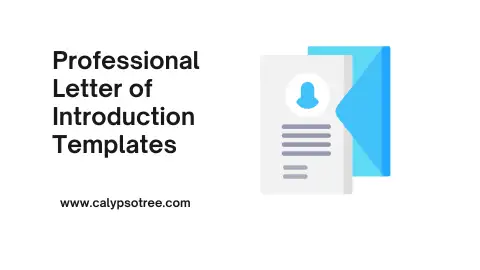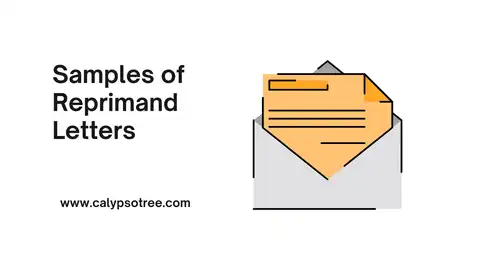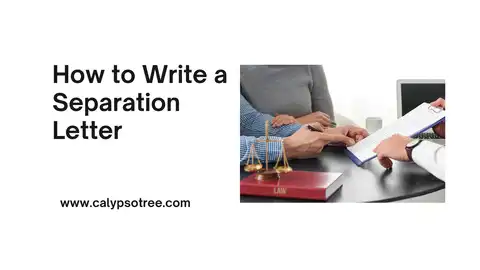Free Sample Jury Duty Excuse Letter Template – A Jury Duty Excuse Letter is an official document written by an individual to justify their inability to serve on a jury.
Its purpose extends beyond formal correspondences; it is a crucial legal tool in maintaining the delicate balance between civic responsibility and personal liberty.
Understanding Jury Duty
Jury duty is a cornerstone of the judicial system in many democratic societies, embodying the principle of judgment by one’s peers. Understanding jury duty can better equip those unfamiliar with the concept to fulfill this crucial civic responsibility.
- The Concept of Jury Duty
Jury duty is an obligation of citizenship that entails participating in the legal process by serving on a jury. A jury is a group of citizens randomly selected to listen to the facts of a legal case and determine a verdict. This responsibility arises from the idea that diverse peers can provide a fair and impartial judgment.
- The Selection Process
The selection process for jury duty aims to ensure a broad cross-section of the community. Names are generally drawn from various sources, including voter registration lists, driver’s license databases, and tax rolls. Those selected are sent a jury summons informing them of their selection and the service date.
- Types of Cases
Jurors may be called upon to serve in both criminal and civil cases. In criminal cases, the jury determines whether the accused is guilty beyond a reasonable doubt. In civil cases, they decide on matters such as liability and damages.
- Length of Service
The length of jury service varies based on the jurisdiction and the case’s complexity. Some jurors may be called for a single day, while others may serve for several weeks or months for long, complicated trials.
- Role of a Juror
The primary role of a juror is to objectively weigh the evidence presented during a trial and render a verdict. Jurors must be attentive, keep an open mind, and only form a judgment once they have heard all the evidence. They must also respect the confidentiality of the deliberation process.
- Compensation
While the remuneration for jury service is typically modest, the intention is to cover basic expenses rather than to act as a wage replacement. Some employers will continue to pay employees during jury service, but policies vary.
Understanding jury duty is crucial not just to fulfill our legal obligations but to appreciate the fundamental role it plays in the administration of justice. Citizens participate directly in the judicial process by serving on a jury, thus fostering a more just society.
Tips for writing a jury duty excuse letter
It requires tact, respect, and clarity. Here are several tips to help write it:
Be Honest and Precise
It is important in a letter. If you fabricate or exaggerate your senses, it may lead to legal repercussions. Additionally, be as precise as potential about your circumstances and why they hinder your ability to do.
Maintain Professional Tone
It is sent to a representative of the judicial system, so maintaining an experienced and compliant tone is essential. Avoid casual language and colloquialisms.
Be Concise
Including sufficient detail regarding your circumstances and avoiding lengthy and extreme elaborations is needed. Be concise and to the point.
Use Correct Salutation and Closing
Begin your letter with the correct formal salutation, and end it appropriately. “Dear Sir/Madam” or “Dear Jury Duty Clerk” are safe salutations. For the closing, consider “Yours sincerely,” followed by your name.
Provide Necessary Details
Include your juror number, full name, address, and other details needed to identify you in the court’s records.
Include Supporting Documentation
Contain documents such as a doctor’s note, proof of a prepaid trip, or a letter from your employer. It can strengthen your case and expedite the decision-making process.
Show Respect for the Process
Recognize the significance of jury duty in your letter and tell your willingness to help in the end if your circumstances allow. It shows that you comprehend the gravity of the process and are not attempting to evade your civic duty.
Proofread
Before sending your letter, proofread it thoroughly to eliminate grammatical or typographical errors. Your letter should convey professionalism and respect.
This delicate task calls for transparency, respect, and conciseness. Following these suggestions, you can effectively communicate your condition and respectfully ask for an exemption or deferral from jury service.
Reasons for Excusing Jury Duty
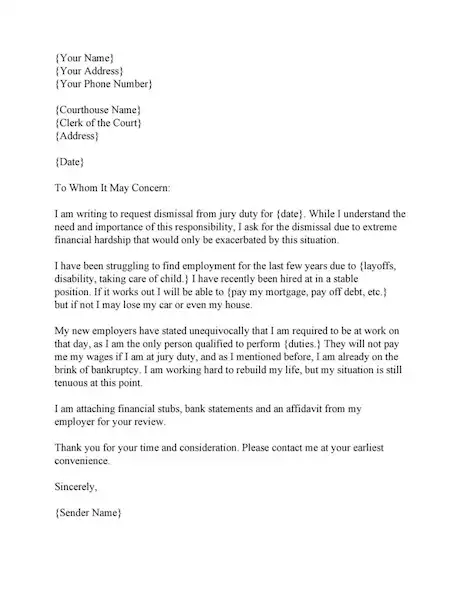
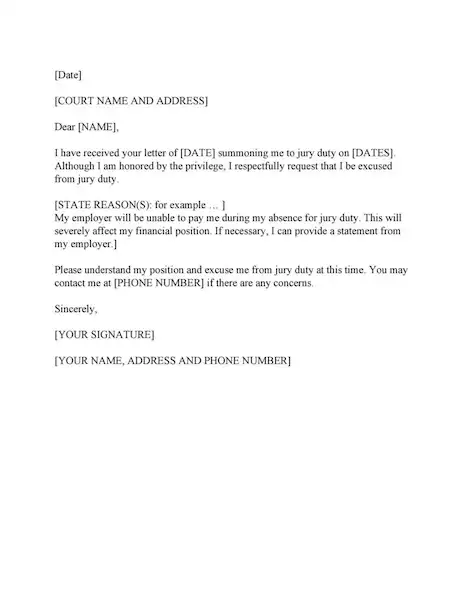
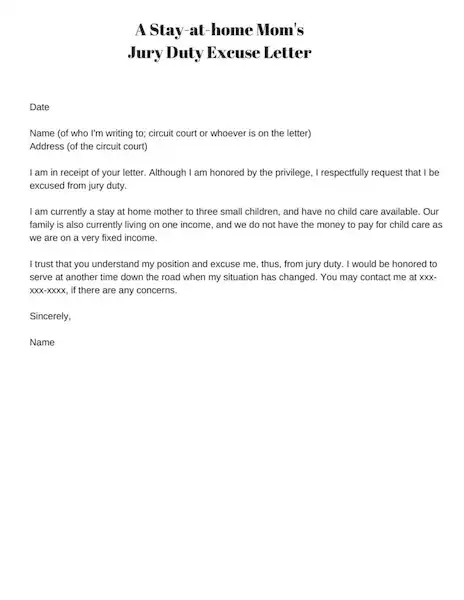
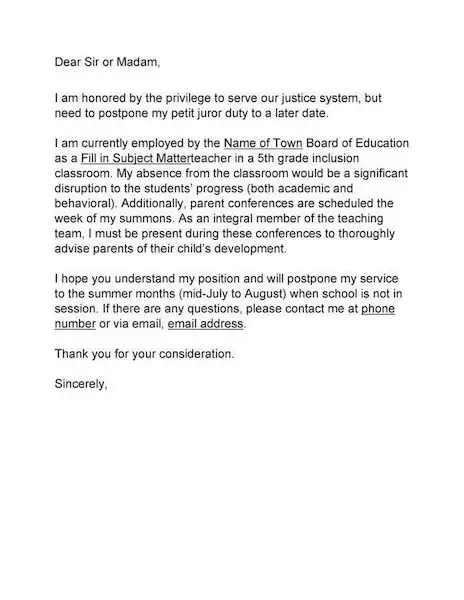
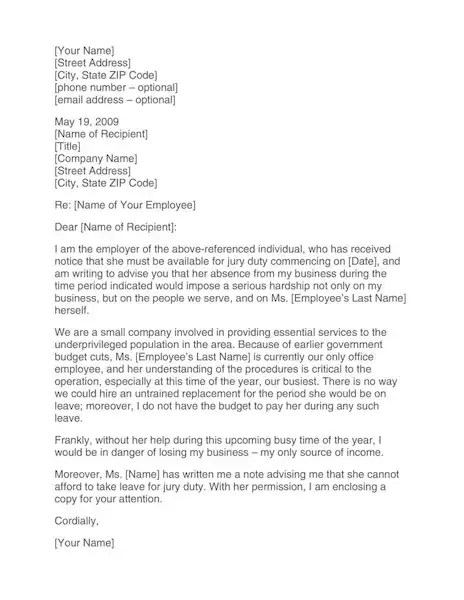
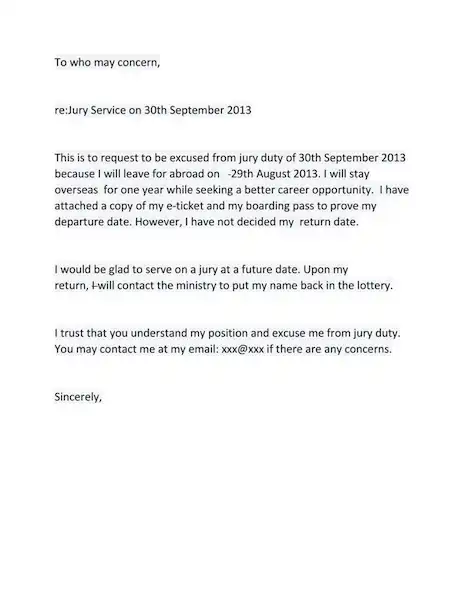
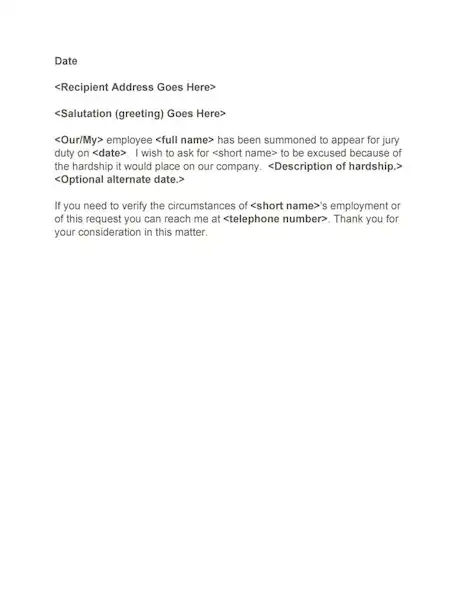
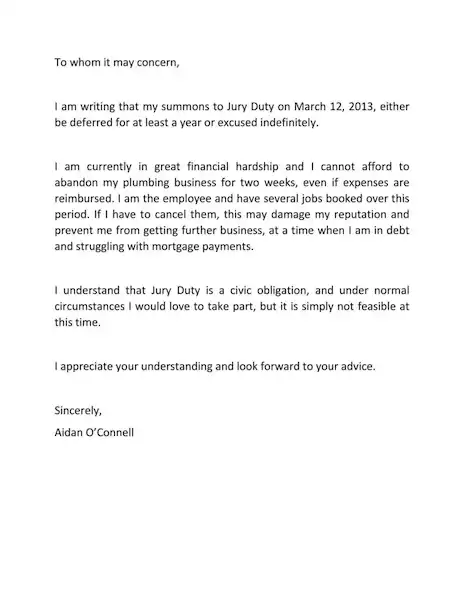
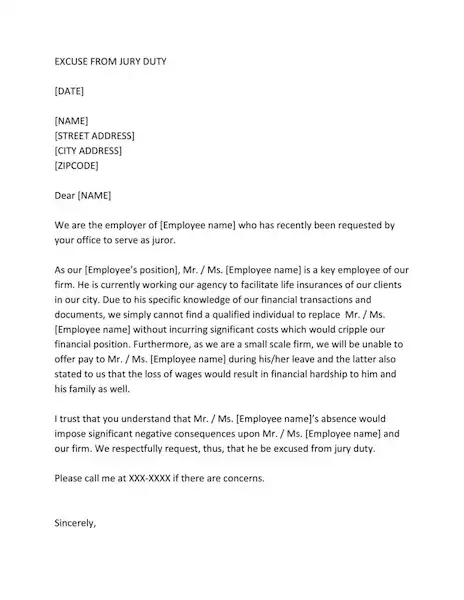
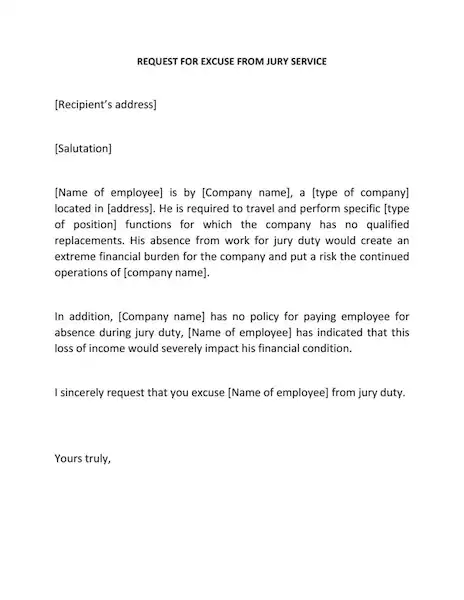
While the legal framework provides a broad template for possible grounds for excusing jury duty, the real-world scenarios can be as diverse as the population. This section outlines some common reasons that, depending on the specific jurisdiction, might be considered valid grounds for excusal from jury duty.
Health Concerns
Health concerns, whether physical or mental, often constitute a justifiable reason for being excused from jury duty. It can range from chronic conditions like heart disease or diabetes to acute illnesses like influenza or COVID-19. In such situations, the potential juror’s health could be compromised or pose a health risk to others. Mental health issues like anxiety or depression might also be grounds for excusal, particularly if the stress of jury duty could exacerbate the condition.
Caregiver Responsibilities
Primary caregivers, whether children, elderly parents, or other family members, may also be excused from jury duty. Balancing the demands of jury duty with caregiver responsibilities could pose undue stress or hardship, particularly if alternative care arrangements are not easily accessible or affordable.
Work Commitments
Work commitments, especially for those in critical roles or those facing particularly busy periods at work, can serve as a valid reason for being excused. However, the job’s nature and the absence’s potential impact on the business or other employees are often considered.
Educational Obligations
Students, particularly those in rigorous programs or during critical exam periods, may request to be excused from jury duty. The interruption to their studies could significantly affect their academic performance and future opportunities.
Pre-arranged Travel
Pre-arranged and non-refundable travel is another reason that can be considered for excusal. Suppose you had booked a trip before receiving the jury summons. In that case, some courts might consider this a valid reason for being excused, particularly if the travel is for a significant event like a wedding or a family reunion.
Bereavement
Experiencing a recent personal loss, such as the death of a close family member, can be grounds for excusal. The grief and stress associated with bereavement can render a person unfit to serve on a jury.
It should be noted that these reasons are only sometimes accepted in some jurisdictions, and the ultimate decision lies with the court. It is always important to provide clear and truthful explanations for any request to be excused from jury duty, accompanied by relevant supporting documentation where necessary.
Legal Grounds for Excusing Jury Duty
While serving on a jury is a civic duty, there are legitimate legal grounds that can excuse an individual from this obligation. These grounds ensure jurors can devote attention and impartiality to the assigned cases.
- Medical Conditions
Medical conditions that can significantly impede a person’s ability to serve as a juror are generally accepted as valid legal grounds for excusal. It could include physical disabilities, severe illnesses, mental health conditions, or sensory impairments. Supporting medical documentation will need to be provided to substantiate these claims.
- Economic Hardship
Economic hardship is another recognized ground for excusal. If serving on a jury would cause substantial financial strain—for example, for self-employed individuals, hourly workers, or small business owners who do not have the luxury of paid leave—courts often consider this a valid reason for excusal.
- Personal Hardship or Extreme Inconvenience
Courts may also excuse individuals from jury duty for personal hardship or extreme inconvenience. It might include a lack of childcare, caring for a sick family member, or having a pre-booked, non-refundable trip. However, it is important to note that what constitutes ‘hardship’ or ‘inconvenience’ can be subjective, and not all personal commitments may be deemed sufficient grounds for excusal.
- Student Status
Full-time students may be excused from jury duty in some jurisdictions because their educational commitments take precedence. It, however, may only be the case in some jurisdictions, and some may defer service to a later date, such as during school holidays.
- Conflict of Interest
A conflict of interest can disqualify a potential juror. It includes a personal or professional relationship with the parties involved in the case or any personal bias or prejudice that could impede impartial judgment.
- Other Legal Excuses
Certain states have additional specific legal grounds for excusal. These may include having served on a jury recently, being a certain age (often 70 or above), or even being a breastfeeding mother.
It is important to remember that these legal grounds for excusal are not to enable individuals to evade their civic duty but to ensure that the serving jurors can do so effectively and impartially. Any abuse of these grounds to evade jury service is subject to legal repercussions.
Writing a Jury Duty Excuse Letter
Crafting a Jury Duty Excuse Letter calls for a balance between articulating one’s circumstances and demonstrating respect for the gravity of the civic duty involved. The aim is not merely to request exemption but to communicate the reasons behind the request, bearing in mind the sanctity of the judicial process.
- Start with a Formal Salutation
Initiate your letter with a formal salutation, such as “Dear Judge” or “Dear [Clerk’s Name],” as appropriate. It displays respect for the Recipient’s office and sets the tone for your letter.
- Identify Yourself Clearly
Provide your full name as it appears on the jury summons, your juror number, and any other identifying information the court might require. It enables easy identification of your case and streamlines the process.
- State Your Request
Clearly articulate your request for an excusable or deferral from jury duty. It should be done at the outset of your letter, leaving no room for ambiguity.
- Explain Your Reasons
Provide a detailed explanation of why you are requesting to be excused from jury duty. Your reasons should be clear, specific, and truthful. Avoid providing unnecessary details; focus on the relevant facts that make it difficult or impossible for you to serve as a juror.
- Provide Supporting Evidence
Where possible, include supporting documentation to validate your claims. For instance, a doctor’s note could support a health-related excuse, while a pre-booked travel itinerary could confirm a travel-related excuse. It reinforces your case and makes assessing your request easier for the court.
- Express Your Willingness to Serve in the Future
Express your understanding of jury service’s importance and willingness to serve in the future if your circumstances change. It demonstrates your respect for the process and intention to fulfill your civic duties when possible.
- End with a Formal Closing
Close your letter formally, thanking the Recipient for considering your request and providing your contact information for any follow-up required.
- Proofread Your Letter
Finally, ensure that your letter is free from errors and professionally presented. A well-written, neat letter makes a better impression and communicates your respect for the court and the process.
A jury Duty Excuse Letter is more than a mere request for exemption; it is a testament to the importance of jury duty and your respect for the judicial process.
Effectively Delivering Your Jury Duty Excuse Letter
The delivery of a Jury Duty Excuse Letter is an exercise steeped in the meticulous observance of protocols and respect for official channels. It is not merely a task to be executed but a manifestation of civic duty, reinforcing the bond between citizen and judiciary.
- Knowing Where to Send the Letter
Knowing the Recipient’s address is the cornerstone of effectively delivering your Jury Duty Excuse Letter. Typically, the addressee is the court clerk, or the jury service office that issued your jury duty summons. Ignorance of this crucial detail can lead to an unintentional failure to respond to your summons, potentially causing unwelcome complications.
- Timeliness of Delivery
The temporal aspect of delivering the letter is equally important. Your excuse letter should reach the court well before your scheduled service date, providing the court adequate time to review your application and decide on its merit. Late delivery could result in the court being unable to process your request in time, undermining your attempt to secure an excuse.
- Using Certified Mail
Utilizing certified mail for delivering your Jury Duty Excuse Letter is strongly recommended. Certified mail allows you to receive a receipt confirming the delivery of your letter. It serves as a tangible record, safeguarding you against claims of non-responsiveness or delays in postal service.
- Including All Necessary Information
Including all pertinent information, such as your juror number, summons number, and scheduled service date, ensures the court can easily identify and process your request. A concise explanation of your excuse and supporting documentation should also be included. This transparent communication aids the court in understanding your situation and validates your request.
- Following Up
Without a prompt response, following up with the court is advisable. This gesture underlines your proactive approach and keeps you informed about the status of your request. It can be done via phone or email, depending on the preferred mode of communication of the court.
Effective delivery of a Jury Duty Excuse Letter reflects your respect for the judicial process and commitment to civic responsibilities. It sends a clear message to the court that you value the role of a juror, but due to specific circumstances, you cannot fulfill it.
Consequences of Ignoring Jury Duty Summons
Neglecting a jury duty summons is not an inconsequential act but a severe breach of one’s civic duties, potentially leading to repercussions. These punitive measures are in place to maintain the efficacy of our judicial system, underlining the importance of every citizen’s participation.
Legal Implications
The legal ramification is one of the most immediate repercussions of disregarding a jury duty summons. Courts hold the authority to pursue legal action against individuals who fail to respond to a summons without a valid reason.
Contempt of Court
In the most severe cases, ignoring a jury summons can lead to a contempt of court charge. This charge signifies a blatant disrespect for the court’s authority, tarnishing the individual’s legal record. A contempt of court citation can result in a court hearing, and if found guilty, the individual may face fines or even imprisonment in some jurisdictions.
Financial Penalties
Ignoring a jury duty summons can also lead to monetary penalties. Fines for noncompliance with a jury summons vary significantly from state to state but can amount to hundreds, if not thousands, of dollars.
Additional Costs
The individual may also be liable for additional costs besides the immediate fines. These may include court costs or legal fees if the individual is summoned to court for noncompliance.
Civil Consequences
Ignoring a jury duty summons can also lead to various civil consequences. For instance, non-compliant individuals may be barred from certain civic privileges until they fulfill their obligation. It might include restrictions on renewing a driver’s license or accessing certain public services.
It is worth emphasizing that these repercussions are not merely punitive but serve to underline each citizen’s integral role in upholding the justice system. Ignoring a jury duty summons, an individual is shirking their responsibilities and undermining the pillars of democratic justice. Therefore, it is incumbent upon every summoned individual to fulfill their duty or provide a valid reason for their inability to serve.
Repercussions of Fraudulent Excuses
Submitting a fraudulent excuse can lead to penalties, including perjury charges. The severity of these repercussions underlines the importance of honesty in these letters.
Possible Outcomes After Submitting an Excuse Letter
- Acceptance of Excuse
The court usually accepts valid and well-articulated reasons for excusing jury duty.
- Denial and Appeal Process
In some cases, the excuse may be denied. An appeal can be made, provided substantial evidence supporting the excuse is presented.
- Exemption from Jury Duty
Exemption from jury duty is a specialized circumstance where certain individuals are not required to serve on a jury, even if they receive a summons. It is distinct from being excused from jury duty, where individuals are called upon to serve present reasons why they cannot fulfill this civic duty.
Criteria for Exemption
The criteria for exemption vary greatly from state to state and are usually outlined in a jurisdiction’s laws and regulations related to jury duty. It is essential for those seeking an exemption to familiarize themselves with their local regulations.
- Age
In many jurisdictions, seniors above a certain age threshold are exempt from jury duty. While the exact age varies, it is usually 65 or 70.
- Profession
Certain professions qualify for an exemption due to the critical nature of their work. These include occupations such as active military personnel, law enforcement officers, firefighters, educators, and healthcare providers. The rationale behind these exemptions is that their work is so vital to the community’s functioning that their absence would be detrimental.
- Personal Status
Certain personal statuses also qualify individuals for exemption. For instance, full-time students are often exempt from jury duty. Primary caregivers, particularly those caring for young children, the elderly, or disabled family members, might also qualify for exemption in certain jurisdictions.
Process for Applying for Exemption
The process for applying for exemption is often similar to requesting to be excused from jury duty. It involves communication with the court, usually through an application form provided court itself.
- Filling Out the Application Form
In the application, the individual must clearly state the reason for their request for exemption. It should be done clearly and concisely and must directly address local regulations’ eligibility criteria for exemption.
- Providing Supporting Documentation
Along with the application, the individual should provide relevant supporting documents that attest to their eligibility for exemption. For instance, those applying for an exemption based on age should provide a copy of an identification document showing their date of birth. Professionals seeking exemption should provide evidence of their current employment status.
- Submitting the Application
The completed application form and the necessary documents should be sent to the appropriate court. It should be done as soon as possible upon receipt of the jury summons to allow ample time for processing.
Response from the Court
The court will review the application and decide based on the information provided. The individual will be exempt from jury duty if the application is accepted. If the application is denied, the individual is still obligated to serve. In most cases, individuals will be notified of the decision in writing.
Read Also: 60 Best Letter of Recommendation Example & Template
It is crucial to note that exemption from jury duty is a privilege, not a right. Courts carefully review each application to ensure that those who genuinely cannot serve are granted exemptions while upholding the principle that jury service is a shared civic responsibility.
Jury Duty Excuse Letter Example
Sample Jury Duty Excuse Letter
This section provides a concise overview of how to construct effective jury duty excuse letters from different perspectives, all while respecting the importance of this civic duty.
From an Employer
Start with a formal salutation, identify the employee by name and juror number, and state your request for their exemption.
Detail the indispensable nature of the employee’s role and the potential impact on the organization should they be absent.
Conclude the letter formally, providing contact information for any necessary follow-up.
Below is a sample of letters from the perspectives mentioned above. These can help as a starting point when crafting.
From an Employer
Dear [Recipient],
I am writing on behalf of my employee, [Employee’s Full Name], who has been called for jury duty.
While we fully comprehend and respect the significance of jury service, I must express that [Employee’s Full Name] is vital to our organization. Their absence for an extended period would seriously disrupt our operations. They have specialized skills that are not easily replaced, and their ongoing project responsibilities are critical to our business’s success.
I ask that [Employee’s Full Name]’s jury service be deferred or excused regarding these possibilities.
Thank you for your time and respect for this request. Please contact me at [Your Contact Information] for more details.
Yours sincerely,
[Your Name]
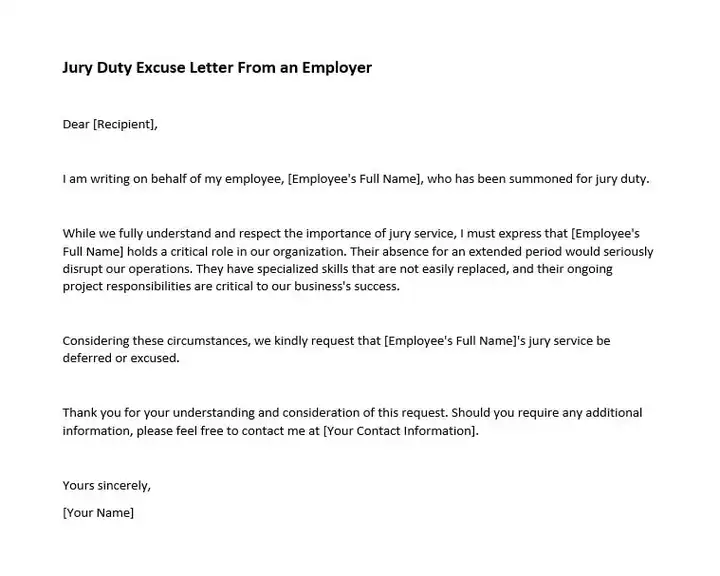
From a Doctor/Physician/Psychiatrist/Therapist
Begin with a formal salutation, identify the patient, and state the medical grounds for their jury duty exemption.
Describe their condition broadly, highlighting how it may interfere with their jury service while avoiding overly personal details.
Express your professional opinion endorsing the exemption, and close the letter formally, providing contact information for any further inquiries.
Dear [Recipient],
I am the attending [doctor/physician/psychiatrist/therapist] for [Patient’s Full Name], who has been called for jury duty. Due to medical reasons, it is in [Patient’s Full Name]’s best interest to be dismissed from this duty.
Without disclosing sensitive information, I can confirm that [Patient’s Full Name] is undergoing medical treatment needing regular appointments and rest periods throughout the day. This medical condition could impair their ability to help effectively on a jury.
Based on these circumstances, I ask that you consider excusing or deferring [Patient’s Full Name] from jury service. I can be reached at [Your Contact Information] for more details.
Thank you for your compassion and respect.
Yours sincerely,
[Your Name]
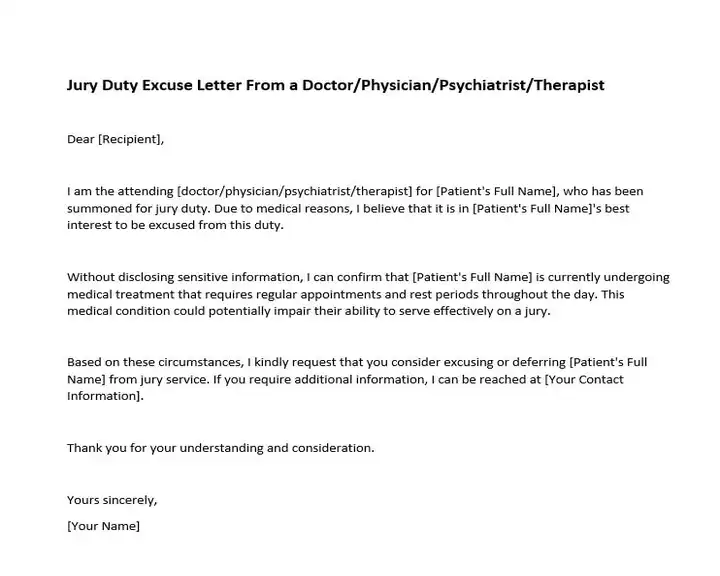
From an Employee
Begin and end with formal salutations and closings. Identify yourself and express your request for exemption due to significant work-related issues. Detail these issues and provide any supporting evidence to strengthen your case. Offer your contact information for follow-up and express gratitude for considering your request.
The ultimate goal is not to shirk jury duty but to present legitimate, honest reasons why performing this service would pose an undue hardship. Respecting the gravity of jury duty in your request for exemption is of utmost importance.
Dear [Recipient],
I request an exemption or deferral from my upcoming jury duty for work-related reasons. I understand the significance of this civic duty, but serving at this time would drive significant hardship to my employer and my professional responsibilities.
I hold a key role in a small organization, and my absence would severely affect our ability to serve our clients effectively. I am also working on a project requiring specialized skills and consistent involvement.
Thank you for considering my request. I am willing to serve in the future when my professional obligations allow me to do so without causing significant disruption.
Please call me at [Your Contact Information] for further details.
Yours sincerely,
[Your Name]
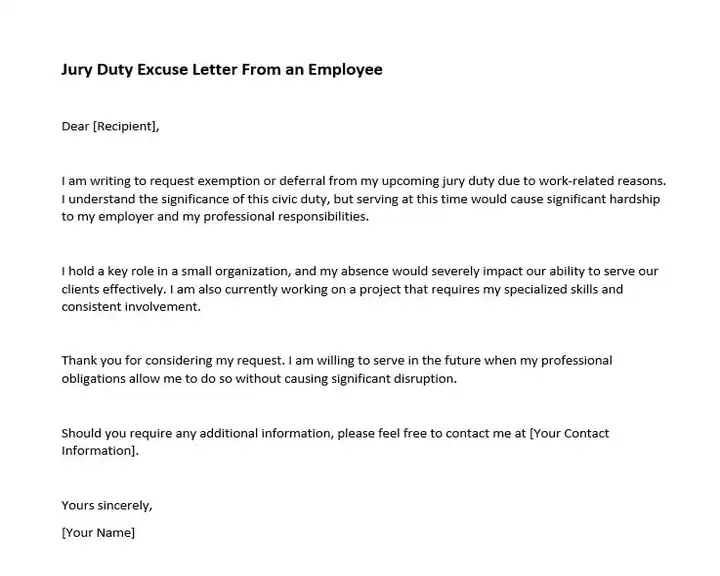
Conclusion
The ethical aspect of jury duty excuses should be addressed. While it is necessary to accommodate personal circumstances, it is equally vital to uphold our civic responsibility when possible. A balance must be struck between these two dimensions to ensure the wheels of justice turn fairly and without hindrance.

The content creator team at calipsotree.com is dedicated to making topics accessible to everyone, with over 9 years of experience in writing and breaking down complex concepts into easy-to-understand articles that answer readers’ financial questions.






